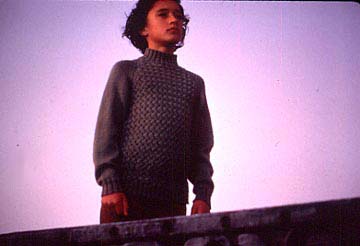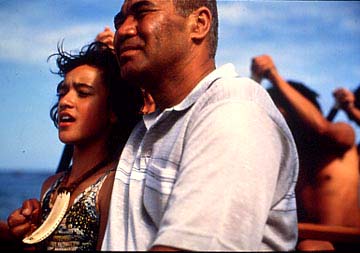

Ever wondered what nationality Cliff Curtis is? He has ambiguous last name and a dark, multiracial look that typically garner him utility roles as a South American or Arab, but he could pass for any sort of Hispanic/Latino, or even Indian. Well, Curtis is Maori, and he returns to his roots here (albeit in a small role) in Whale Rider, a beautiful new film that is finally seeing a limited release after touring various film circuits and garnering lots of awards (including the Audience Award at the 2003 Sundance Film Festival and the People's Choice Award at the 2002 Toronto Film Festival). Whale Rider hails from New Zealand, up to this point most famous for being the setting for The Lord of the Rings. Australia, its bigger neighbor, typically overshadows New Zealand in terms of films released here, but in the past couple years, Kiwis have managed to surface such diverse films as The Price of Milk and Rain.
Whale Rider draws upon some of the primordial myths of the Maori, and ties it in with some serious issues that plague many cultures. Koro (Rawiri Paratene, Accidents, What Becomes of the Broken Hearted?), the tribal chief, teaches that one of their ancestor Paikea, came to New Zealand atop a whale. Each firstborn son eventually takes leadership of the tribe, and Koro is the current leader, descended directly from Paikea. His son Porourangi (Curtis, Collateral Damage, The Majestic), like many of the other Maori, shun the traditional ways. He believes that there is no future there, and flies around the world exhibiting art. Twelve years ago, Porourangi's wife gave birth to twins, a boy and a girl. Sadly, the boy (firstborn) and Porourangi's wife died in childbirth, leaving a daughter, Pai. Because of Pai's gender, she would never become chief. Koro himself loves her as his granddaughter, yet feels resentful of her because she constantly reminds him of his loss.
Whale Rider, based on Witi Ihimaera's novel, is Pai's story. Pai (Keisha Castle-Hughes) is at the age where she is beginning to ask questions. She doesn't understand why she cannot lead the tribe. Koro is realizing that Porourangi has no interest in becoming chief, especially after he reveals on one of his infrequent visits that his German girlfriend is pregnant. Koro decides that he must find a new chief among the firstborn sons of the tribe, because he feels that it is upon his shoulders to see that the old ways and the tribe, survive. He puts forth a series of tests, and he believes that the one destined for chief will pass these tests. He will not let Pai participate, simply because she is female. His affection for her turns quickly as she tries to question the traditional ways and assert herself. Realizing that her grandfather hates her just because she is a girl is a horrible burden for a little girl to bear.
And it is a phenomenal performance for Castle-Hughes, who shows depth beyond her years (this is her first role!) as Pai. She easily carries the movie, and is riveting to watch on screen. Adapter/director Niki Caro (Memory & Desire, Sure to Rise) requires a huge range from Castle-Hughes, who can act like a preadolescent in one scene and an adult in another. She really rises to the occasion in the third act, where Pai begins to realize how she figures into the destiny of her people. There is a scene where Pai is reciting a poem in a school play that is just heartbreaking. In fact, all of the performances are good. Paratene has somewhat of a one-dimensional role, but he imbues Koro with enough internal conflict to make him seem more than just an old man who refuses to change. Vicky Haughton (Her Majesty, Jubilee) also has a nice role as Flower, Koro's wife.
Caro does a great job with the visuals, and uses Koro's lessons as something of a primer for Maori culture. At times, Whale Rider feels like a dream. Caro successfully mixes myth with reality, taking the story of a little girl who wanted something more, and turning it into an emotional, memorable story. This would be a great film for children if not for its pacing. Whale Rider is not slow, but moves at its own pace, that mimics life for these particular Maori. Unfortunately, some younger kids may get bored watching it. The real shame is that the rating on this film is PG-13, which may otherwise prevent some parents from taking their children. Especially considering the junk that Hollywood films can get away with now in PG-13.